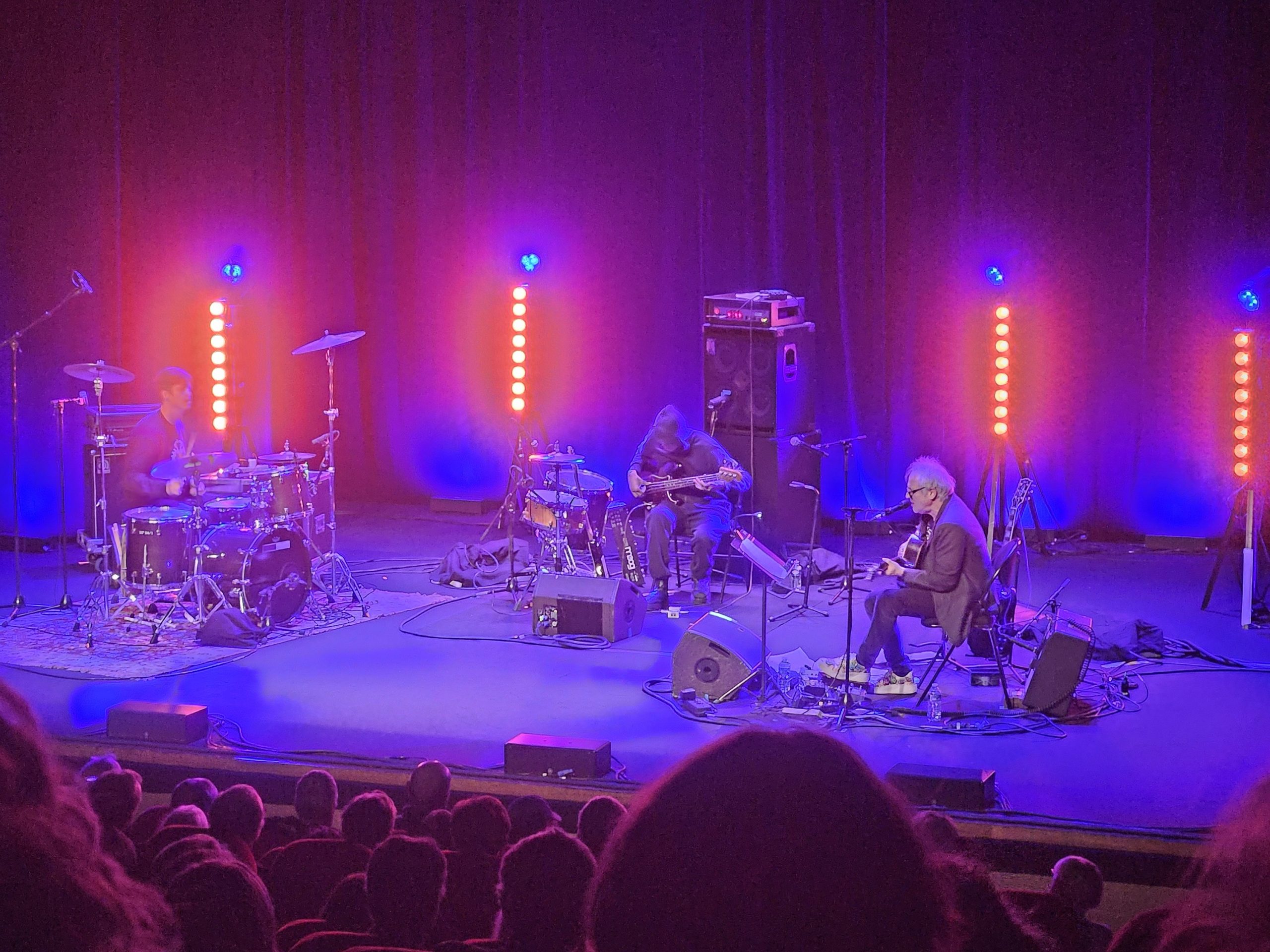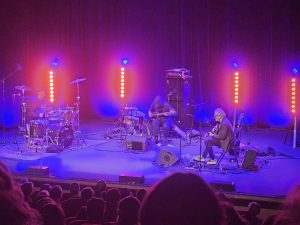

Guitarist Marc Ribot turns 70 in May. A significant, beautiful, round anniversary that testifies to the immense legacy of this hero of contemporary music. Simultaneously, it suggests that he has many fruitful years ahead, citing the historically proven longevity of jazz and avant-garde musicians. He is enough big and relevant to have his concerts and festival performances branded with such anniversaries, following the practice of his longtime musical associate and companion John Zorn. On the other hand, this strategic planning of concert performances gives them an additional value that goes beyond mere marketing. Many of us have already seen his concerts, but a few performances in a row, with different line-ups – now, that’s a real treat that should not be missed!
At the beginning of the year, he already had a triple performance at the New York Winter Jazz Festival, and the first anniversary performance in Europe took place in Paris on January 23 and 24 as part of the Sons d’hiver Festival (Winter Sounds). For the first of the two mentioned dates, a duo performance with Shahzad Ismaily was announced under the title “Words and Music of Resistance,” while the next day featured a double program: “Marc Ribot New Trio with special guest James Brandon Lewis,” as well as Ribot’s well-known band Ceramic Dog. Only this second night carried the official label “Marc Ribot 70 ans,” while on the first night, Ribot performed before the lineup of Chilean musician Newen Tahiel (formerly known as Carlos Maza).
<iframe src="https://www.facebook.com/plugins/post.php?href=https%3A%2F%2Fwww.facebook.com%2FSonsdhiver%2Fposts%2Fpfbid0JuT7521MBzmrbafaRPAwWq14gnGUVQKrzvTCGPXLegM7KGdtJ3mXBAMAnLbLMqSVl&show_text=true&width=500" width="500" height="726" style="border:none;overflow:hidden" scrolling="no" frameborder="0" allowfullscreen="true" allow="autoplay; clipboard-write; encrypted-media; picture-in-picture; web-share"></iframe>Intimate Music of Resistance
The repertoire of the performance with Shahzad Ismaily heavily relied on the outstanding album “Songs of Resistance: 1914-2018,” whose title is indicative of its content and unmistakably connected to the concert’s title. However, while the album was packed with famous guests and relied on lively band playing and various types of guest vocals,Top of Form, the Paris performance had to be understated and intimate. Ribot himself took on the role of a singer, which he has been fond of in recent years.
Anyone who has ever seen Ribot live or listened to his albums knows that this musician is known for his seemingly casual, “imprecise” guitar playing that may sound like “mistakes” even to well-trained jazz listeners. However, these “mistakes” always find their perfect place in the broader musical picture and band environment while simultaneously challenging and teasing the listener to abandon their notions of “beautiful” and “correct”, even when they think they are free-spirited and open. When you combine this with Ribot’s even more relaxed singing, where precise diction and intonational clarity merge with punk-like anger in a peculiar way, the listener’s challenge becomes even more intriguing.
The first 10-15 minutes of the Paris concert sound as if you’ve stumbled upon a soundcheck, perhaps backstage or an informal home jam session where musicians tune and warm up, gaining momentum. At the same time, you feel privileged to be in the presence of greatness. You feel like you’re somewhere that isn’t a large festival concert in a big city, that the sometimes internalized pressure to like the concert at all costs, because you’ve paid for a ticket and dedicated precious free time to see your favorite musician, isn’t there. Yes, you might think the famous guitarist is too “careless,” but in the overall experience of his performance, that becomes irrelevant. Marc Ribot draws you into his world, brings intimacy, and creates a special connection between the performer and the audience.
As he transitions from noise and anger into more delicate moments, you’ve already arrived in the middle of a house party. Once again, the rearranged “Bella Ciao” sounds so wonderful that you forget how Tom Waits sang it on the aforementioned album. Every detail is in its place, and Ribot now sounds like a top-tier balladeer, a refined songwriter on par with Cohen or Dylan. “Rata de dos Patas,” originally an energetic tribute to “rat” Donald Trump, astonishes the listener with its pure and understated beauty. Shahzad Ismaily discreetly and functionally accompanies Ribot throughout, primarily in the role of a drummer, occasionally switching to other instruments.
Just as you settle into this delicate “living room” music, Ribot becomes a stand-up narrator in a twisted “tribute” to the Empire State Building based on a tourist brochure text, which in this version can be read as a hilariously entertaining anti-capitalist manifesto. And then the culmination –”The Activist,” originally recorded with Ceramic Dog, a gem of slam poetry, retains a similar performance style here but Ribot combines it here with a very twisted avant-garde musical accompaniment, which barely remotely resembles the original composition. Bravo!
<iframe src="https://www.facebook.com/plugins/video.php?height=476&href=https%3A%2F%2Fwww.facebook.com%2Fjazzin.rs%2Fvideos%2F316100678077354%2F&show_text=false&width=476&t=0" width="476" height="476" style="border:none;overflow:hidden" scrolling="no" frameborder="0" allowfullscreen="true" allow="autoplay; clipboard-write; encrypted-media; picture-in-picture; web-share" allowFullScreen="true"></iframe>
Trio of Four
So, as already mentioned, the first concert of Ribot’s second festival night was titled “Marc Ribot New Trio with special guest James Brandon Lewis.” This formation premiered recently in New York and now, for the first time, in Europe. It consists of bassist Hilliard Green, drummer Chad Taylor, and saxophonist James Brandon Lewis. We don’t know Ribot’s future plans for this lineup, but the initial impression is that the lineup with Lewis sounds exceptionally cohesive and compact, suggesting a natural progression to a quartet. Perhaps it’s just a disclaimer due to the busy schedule of one of the most valuable (and best) contemporary saxophonists, allowing room for substitution or a return to a basic trio?
Regardless, the Paris concert was a spectacle in the classic jazz sense. It was also a shift from the previous night’s performance: this time, Ribot was exceptionally focused and musically precise, just like the rest of the band. Of course, we got generous doses of Ribot’s solos in his signature style, this time leaning more towards jazz discourse than blues and punk. Chad Taylor played a significant role as a kind of link between Ribot and Lewis, having a long history of performing with both, and serving as a drummer with clear focus, often using sticks on the drum rim, producing a very clear, sharp tone, leaving enough room for everyone else in the sound picture. So, this was a concert somewhere between what we hear in bands of James Brandon Lewis, inspired by Coltrane’s spirituality and virtuosity, and the legacy of Ribot’s Spiritual Unity trio. In the Paris concert, no one was the “featured soloist”, which was highlighted by the balanced sound mix.
Resolution
After two entirely different concerts, the Ceramic Dog lineup sounded like a synthesis of everything we had heard before. Since Shahzad Ismaily (bass, drums, synth) was again present, this was expected, while Ches Smith, the drummer, successfully navigated between solid rock or metal rhythms (in a blindfold test, you might occasionally think you hear Lars Ulrich) and a wide spectrum of contemporary and avant-garde jazz. This performance was the most unburdened by pomp and expectations since it didn’t handle either the programmatic activist-political potential (“Music of resistance”) or the (justified) expectations regarding the improvisational skills of a first-class, all-star jazz lineup.
That doesn’t mean anything was lacking. Marc Ribot was once again the leader of the lineup that could delve into singing and playing alternative rock, but a good part of the concert was also focused on instrumental sections. For example, one of Ismaily’s solo feats with synth playing in bagpipe style was particularly striking, escalating into a hard psychedelic vibe.
Post Scriptum
Both concerts within the Sons D’Hiver festival took place in distant urban and suburban Parisian settlements, which is not a typical situation in Balkan capitals, and likely not in a broader Southeastern European context. Both venues adhered to the highest stage standards and had decent capacities for between 300 and 500 people. The public transportation to these locations is very functional, and the overall standard of this concert offering was quite comparable to the best concert venues in Belgrade, such as the Dom Omladine Beograda, or the capital’s theatrical halls.
<iframe src="https://www.facebook.com/plugins/post.php?href=https%3A%2F%2Fwww.facebook.com%2Fphoto%2F%3Ffbid%3D134886268641641%26set%3Da.134886255308309&show_text=true&width=500" width="500" height="442" style="border:none;overflow:hidden" scrolling="no" frameborder="0" allowfullscreen="true" allow="autoplay; clipboard-write; encrypted-media; picture-in-picture; web-share"></iframe>Although decentralization has long been a relevant topic in Serbia, it seems that this local decentralization has somewhat eluded our public discourse, no less significant when it comes to the number of people, economic status, and options for entertainment and cultural upliftment for those living near major urban centers. Of course, Paris and Belgrade, as well as France and Serbia, are not directly comparable. However, that doesn’t prevent us from aspiring to such standards, from small organizers to creators of cultural and urban policies.



